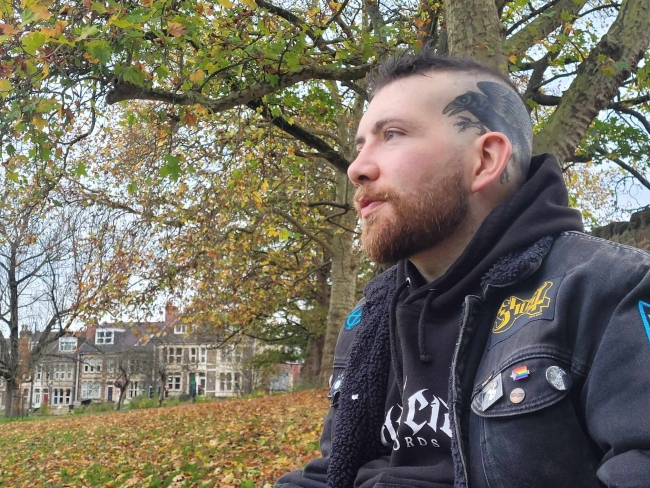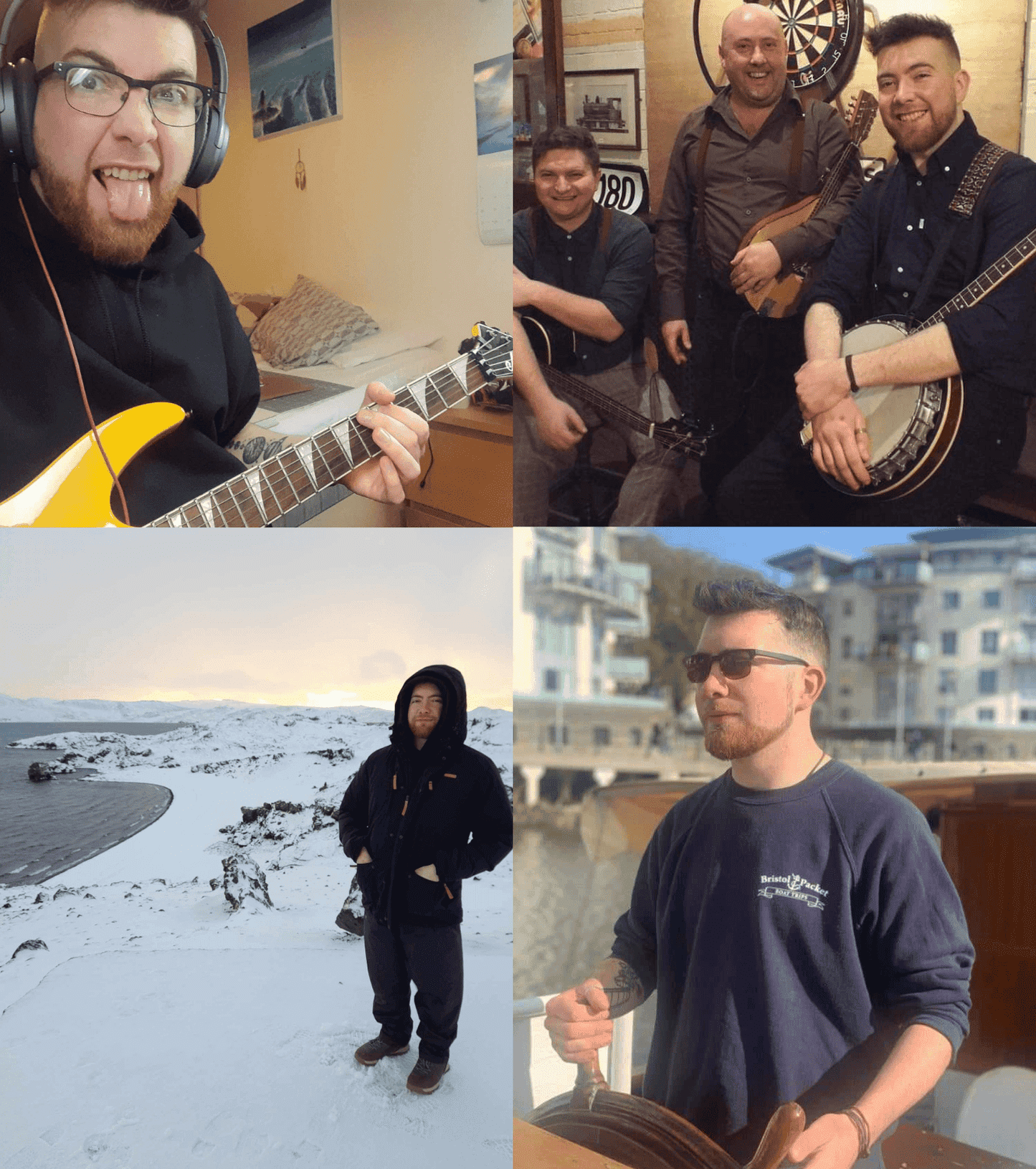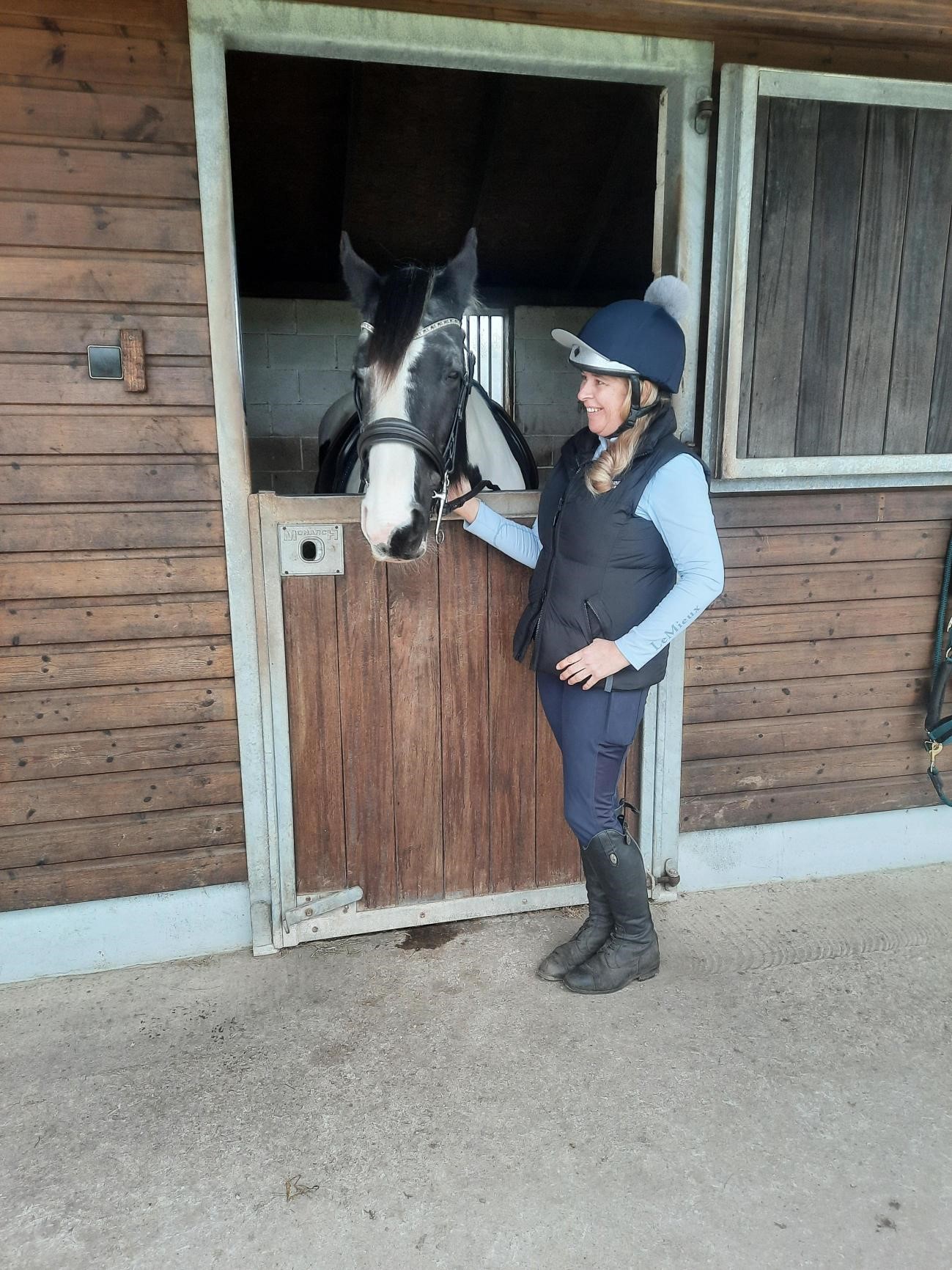15 October 2025 Living with MND
Meet Patrick...
Originally from Derbyshire, Patrick moved to Bristol to study music and has lived in the vibrant city since. A talented musician with the ability to play a wide variety of instruments - though his main focus was guitar - he was diagnosed with primary lateral sclerosis (PLS) (a rare form of MND) in December 2023 at the age of 30. Patrick's symptoms included foot drop, balance issues and eventual weakness in his limbs and voice. Music is vital to Patrick's wellbeing and he was able to use a financial grant from the Association to help him continue to follow his dream - making music. Here, Patrick shares his experience of MND and emphasises the importance of patience and understanding from others.
Early Symptoms and diagnosis
"The testing acts as a stepping stone, ruling things out until you get to MND."
In 2021 I noticed I couldn’t tap my left foot as quickly as my right foot and as a musician you tap your foot a lot, so it was quite noticeable. But I kind of ignored it for a year and then in April 2022, it was noticeably worse. It felt stiff and slow, and I couldn’t lift my toes up to the ceiling like I could with the other foot. I also started tripping up a lot because of it. I had lots of injuries from tripping so much. My day job was working on boats, and I’d had a few accidents which could have been quite dangerous now I think of it. I did go overboard once at night. I was holding a bunch of rope, and my balance wasn’t right, so I fell in – that was quite scary.
When I first had my initial symptoms I went for lots of different tests. I had several MRIs which I really enjoyed, I quite liked the sensory deprivation. Then I had several nerve conductivity tests where they attach wires to you and gently electrocute you to see what happens. I had two lumbar punctures – they were my least favourite. They put a needle in your spine to take a sample of the fluid to make sure there are no infections. The testing acts as a stepping stone, ruling things out until you get to MND. That process took maybe a year and a half to two years.
I had spent the time working up to the diagnosis processing everything, so I had acknowledged it was coming. But, being told… no one really tells you how to prepare for that. I think in the moment I took it rather well because I kind of knew it was coming. My parents, who were with me had a harder time. They have been with me every step of the way, they are brilliant.
I was always worried about that diagnosis. It felt like the worst thing they could say. I only knew a bit about MND before.
The impact of MND
"What is happening to me affects not only me, but everyone around me, and I hate that."
Eventually, what I was experiencing with my foot spread up my leg, so I had one weak leg (my left leg), but then that moved to the other leg as well. First the foot, and then the leg. I started walking with a stick to help me with my balance. Eventually I felt the weakness move up into my arms, then my hands, then my voice. I don’t sound like I used to.
I use walking aids like crutches and a wheelchair and other daily aids. It's hard, but the more willing you are to adapt, the better things will be. I’ve always been very independent, even when I lived at home with my mum and dad and my brother, growing up I would often be squirrelled away in my room. It has been extremely hard having to rely on everyone to help, but if the roles were reversed, I would want to be there for the person I care about. It can be easy to get frustrated or irritable. I try very hard not to because I’m extremely grateful for their help. I’m a bit of a perfectionist so a lot of times I just want to do it my way.
What is happening to me affects not only me, but everyone around me, and I hate that. I really don’t like the effect it has on people. It would better if it only hurt me.
Life now, music and MND
"All of these different things which I would associate with being me, I can’t do them anymore."
My life looks completely different now. I worked on boats before and was a very outdoorsy person. I feel like I’ve spent a great deal of time and effort in my life learning and trying to perfect different skills. Learning instruments, singing, working on boats, painting models, I was a barista and trained to be a barber. I did everything for as long as I could, and I have grieved every one of them.
All of these different things which I would associate with being me, I can’t do them anymore and that can make you feel like you’re not you anymore. That really is the hardest part and the biggest impact MND has had on me. It’s made me let go of so many things that I feel make me who I’m.
I still compose music, and I spend most of my time doing that. I use my laptop and a special software, and I then give the music tabs to my guitarist, and he will play it for me. I think it keeps me mentally strong because I’m creating. It’s my purpose. Music is my life.
Association support
"The grants from the Association are brilliant. It really makes the world of difference to your quality of life."
I was very adamant I didn't want to talk or meet anybody else with MND, and I maintained that stance for quite a while – well over a year. I’m not sure what changed, maybe curiosity. Most people won’t understand the little things. Something as simple as picking up your phone or opening a can or making a cup of tea, all of these things are adventures in frustration and irritation. You can imagine, but you won't fully appreciate it unless you've had to do it yourself.
I was inspired to join the MND Association online support group and talk to some other people with the illness. I think really just to have a rant and to feel like the person I’m talking to actually fully gets it. I needed to do it in my own time. I realised from joining the support meeting the same disease can behave hugely differently in different people. There is no ‘hard and fast’ rule. I was really hesitant to go, but I'm glad. It was positive.
The grants from the Association are brilliant. It really makes the world of difference to your quality of life. I’ve bought a few fun things, like software for my music making so I can still follow my dream, even though I can’t go out and earn a living like I used to. The support from the MND association is brilliant, but it's up to you how much or how little you want to take.
Advice to others
"You're going to feel frustrated and angry and sad, but you have to be kind to yourself."
Something I personally worry about is, I don't want to be ‘Patrick, the guy with MND’. It’s not who I am, it’s something I have to deal with. I worry especially with my speech people assume that the mind matches the body, but I’m fully switched on and thinking 100 times faster than I can speak. I want people to remember and understand I’m not the guy with MND, I’m me.
You're going to feel frustrated and angry and sad, but you have to be kind to yourself. Let the emotions be what they are, and you’ll probably find you are stronger than you know and more resilient than you realise. Your life is not over, it just looks different now.


